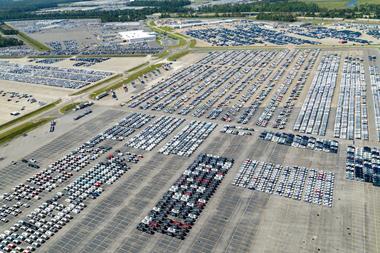Mercedes-Benz Trucks is celebrating the 50th anniversary of operations at its complete knockdown (CKD) centre at the Wörth plant in Germany, where more than 700,000 truck parts kits have been made since it opened in 1966.
Last year the centre dispatched 13,000 kits for reassembly in facilities around the world, including South Africa, Saudi Arabia and Malaysia. The truckmaker has announced it will be investing a further €3m ($3.4m) in the centre by 2018 to secure growth outside of Europe.
“For 50 years our CKD-Center has played a key role in reinforcing our position in important growth markets outside Europe,” said Gerald Jank, head of the Mercedes-Benz Wörth plant. “At the centre of competence for CKD production, our highly qualified workforce knows exactly how to produce trucks at top quality and ship them overseas for assembly.”
According to the company, the flexibility at the centre means it is able to meet global customer requirements at short notice. Those customers also benefit from the lower import duties on CKD kits compared to finished vehicle imports.
Mercedes-Benz Trucks also said that Wörth would be shipping CKD truck kits to Iran, following the lifting of sanctions against the country this year. While a date for the start of shipments to the country has not been set yet, a spokesperson for the truckmaker said it was pushing forward the start of activities together with its partner, Iran Khodro Diesel. Mercedes-Benz Trucks first shipped kits to Iran when the Wörth plant started production in 1966.
The CKD plant is located about 4km from Rheinhafen Wörth inland port so almost all the kits made are transported from there and by the North Sea ports. “In exceptional cases only, a very few kits are transported by road and truck,” said the spokesperson. “This serves very specific regional demands, like wide cabs that would not fit into sea containers.”
The truckmaker was unwilling to reveal with which transport and logistics providers it was working, however.
The Wörth plant is Mercedes-Benz’s largest truck assembly facility and produces the Mercedes-Benz Antos, Arocs and Atego trucks, as well as the Actros.






















